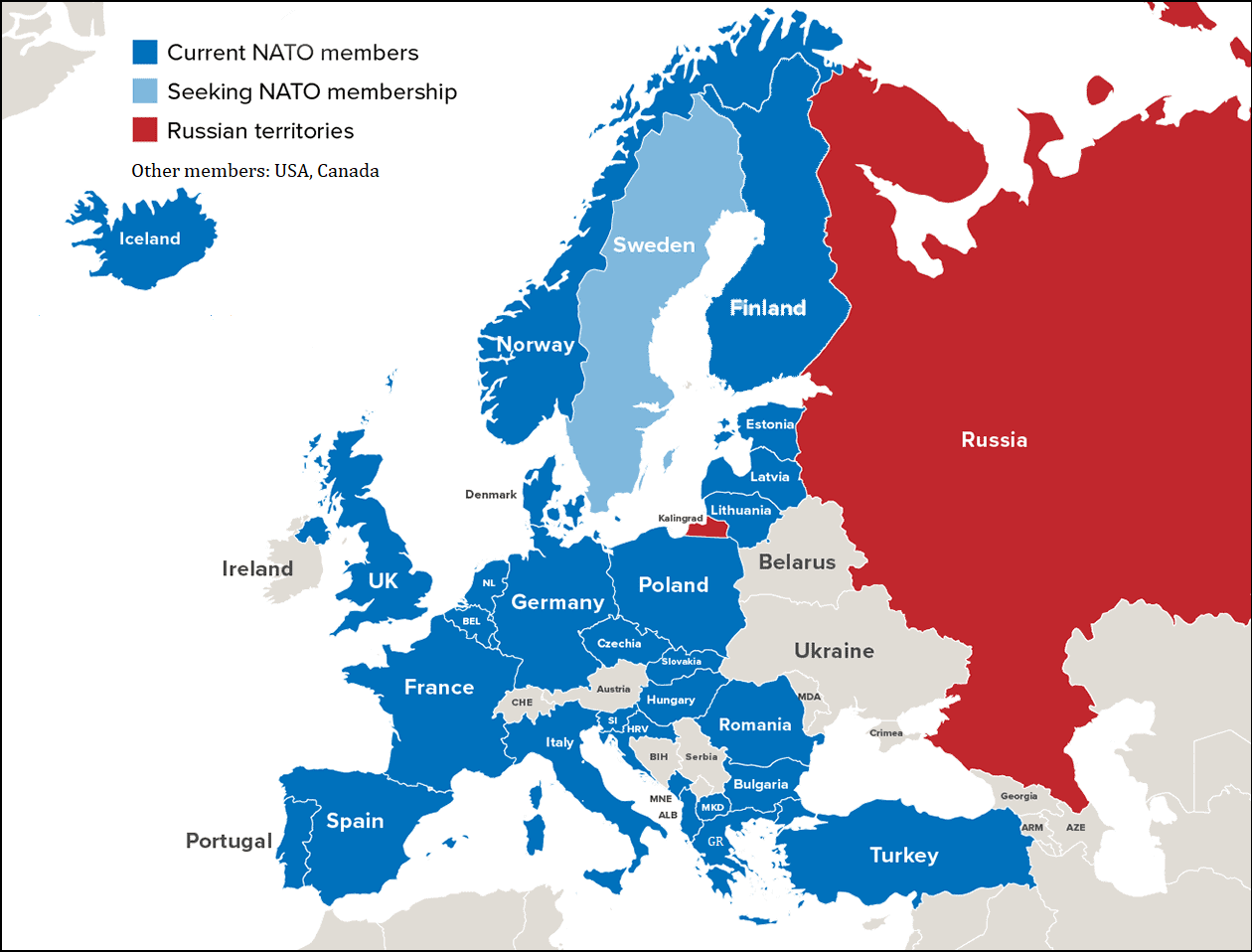Expansion of NATO
2023 APR 20
Mains >
International relations > Strategic Groupings > International groupings
IN NEWS:
- Finland has joined the North Atlantic Treaty Organization (NATO) as its 31st member. With this, it has ended its policy of neutrality known as ‘Finlandization’.
|
NOTE:
- ‘Finlandization’ refers to the policy of strict neutrality between Moscow and the West that Finland followed during the decades of the Cold War.
- The principle of neutrality was rooted in the Agreement of Friendship, Cooperation, and Mutual Assistance that Finland signed with the USSR in April 1948.
- Article 1 of the treaty reads that in the eventuality of Finland, or the Soviet Union through Finnish territory, faces an armed attack by Germany or any state allied with the latter (meaning, essentially, the United States), Finland will, true to its obligations as an independent state, fight to repel the attack.
- Finland will in such cases use all its available forces for defending its territorial integrity and, if necessary, with the assistance of or jointly with, the Soviet Union.
|
NORTH ATLANTIC TREATY ORGANIZATION (NATO):
- NATO is an alliance of countries from Europe and North America.
- NATO’s purpose is to guarantee the freedom and security of its members through political and military means.
- The foundations of the NATO were officially laid down in 1949 with the signing of the North Atlantic Treaty, more popularly known as the Washington Treaty.
- Collective defence is at the heart of the Treaty and is enshrined in Article 5.
- Collective defence means that an attack against one or several of its members is considered as an attack against all.
- So far, Article 5 has been invoked once - in response to the 9/11 terrorist attacks in the United States in 2001.
- All Alliance decisions are taken by consensus, with each Ally having an equal say.
- NATO's main headquarters are located in Brussels, Belgium, while NATO's military headquarters are near Mons, Belgium.
NATO MEMBERSHIP:
- NATO membership is open to any other European state in a position to further the principles of the Treaty and to contribute to the security of the North Atlantic area.
- In 1949, there were 12 founding members of the Alliance. At present, NATO has 31 member countries:
- Founding members: Belgium, Canada, Denmark, France, Iceland, Italy, Luxembourg, the Netherlands, Norway, Portugal, the United Kingdom and the United States.
- Other members: Greece, Turkey, Germany, Spain, Czechia, Hungary, Poland, Bulgaria, Estonia, Latvia, Lithuania, Romania, Slovakia, Slovenia, Albania, Croatia, Montenegro, North Macedonia and Finland.

SIGNIFICANCE OF NATO:
- Ensure peace:
- NATO strives to secure a lasting peace in Europe, based on common values of individual liberty, democracy, human rights and the rule of law.
- Take preventive actions:
- NATO also engages where possible and when necessary to project its values further afield, prevent and manage crises, stabilise post-conflict situations and support reconstruction.
- Address new threats:
- With the collapse of the Soviet Union and the rise of non-state actors affecting international security, many new security threats have emerged, such as terrorism.
- Prevent escalations:
- Since 2014, Russia’s actions against Ukraine have radically altered the security environment. NATO’s presence is essential to prevent the escalation of such actions into another global war.
IMPACT OF NATO EXPANSION:
- Revival of NATO:
- Russia’s actions have given a new sense of purpose and enhanced the attraction for NATO in Europe. NATO has been revived and traditionally non-aligned nations have been forced to reassess their long-standing policy positions.
- Weakens global peace:
- Russian aggression and expansion of NATO has forced countries to relook at their post-World War II security posture, especially nations that were committed to military non-alignment earlier, such as Finland or Sweden.
- Growth in non-western allies:
- NATO expansion is resulting in an ever-closer embrace of China by Russia. However, the Moscow-Beijing entente is causing concerns in New Delhi.
- Also, China’s is strengthening its profile in West Asia at a time of lowering American engagement in the region. Eg: The China-brokered deal between Iran and Saudi Arabia.
- Strain on India-Russia defence ties:
- With NATO expansion, friction between Russia and the West is poised to escalate. This could affect India’s defence relations with Russia.
- Eg: Due to the Ukraine war, Defence ties are under strain with the Indian Air Force publicly stating that Moscow is unable to fulfil its commitment to provide India’s military with essential defence supplies.
- Address common concerns:
- There is a convergence in the perspectives of both India and NATO on China, terrorism, and Afghanistan, including Pakistan’s role in Afghanistan. So, engaging NATO in a political dialogue would provide an opportunity to address issues of concern to India.
- Weaken strategic groupings:
- The continuing conflict in Europe and China’s big-ticket diplomacy in the Middle East is poised to impact the I2U2 (Israel-India-UAE-US) grouping and the Quad.
PRACTICE QUESTION:
Q. There are fundamental structural changes shaping the security landscape in Europe and they are casting their shadow on Indian foreign policy and national security. Discuss.
